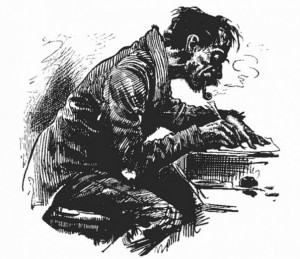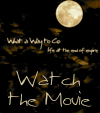Whoever you are, no matter how lonely,
the world offers itself to your imagination,
calls to you like the wild geese, harsh and exciting -
over and over announcing your place
in the family of things.
Mary Oliver, Wild Geese
For the longest time, I found it really difficult to imagine, create, or buy into a vision for the future. People would hand me thick folders full of their ideas and plans. Others would send me links and attachments. Some, often after screenings of our documentary, would tell me face to face what it was they were excited about. And many other visions and plans came across my radar just by virtue of my being connected into the Doomosphere™. But by and large, whether it was the relocalization movement, the biochar revolution, or the audacity of hope, whether any of these might be good ideas or not, I just couldn’t manage to really feel the excitement that so many around me appeared to be feeling.
For the longest time, I felt like a failure. I felt like I was doing something wrong. And a few people even told me that that was true, that if I wasn’t envisioning a positive future then, by default, I was envisioning a negative one, making me a part of the problem. They complained that What a Way to Go didn’t have anything at the end that they could latch onto, nothing in terms of a vision for what we could do. There was no happy chapter. There was no this and this and that which, if only everybody would do, would allow us to find the solution. Some people very much wanted such a vision. They wanted to have something they could get excited about doing. They wanted to find a way out of the mess I had outlined in the movie. And I just didn’t have that to give to them.
And then one cold, wintry day, while we were driving through the Vermont mountains, a piece of clarity alighted on Sally and me from above, and that clarity has served me since: This is not the time for visions. At least not for us.
The sense of failure I’d been laboring under has not returned to haunt me.
Here’s what came to us that day: it makes sense (and it resonates with us) to view our collective situation - our present predicament, our long emergency, our powerdown, our doomsday, our danger/opportunity, our end of suburbia, our life after the oil crash, our nuclear holocaust, our great turning, our die-off, our financial Armageddon, our eleventh hour, our petrocollapse, our overshoot, our endgame, our final crash, our mass extinction underway, our six degrees, our final empire, our ascent of humanity, our revenge of Gaia, our end of the world as we know it - as an initiation into cultural maturity at a grand and terrible scale, as some sort of a vision quest for the collective heart, mind, and soul. If that is so, it may help us to remember that the initiate does not go into the vision quest with a vision already in mind. That’s what makes it a quest. Initiates go first into the sweat house or death lodge, or embark on some similar process, or simply find themselves in a “dark night of the soul.” During this time the elders urge them to shed what needs to be shed, to symbolically “die.” Only then are they released into the wilderness to prove themselves ready and worthy, to be given a vision by the gods. And only then, upon their return, having faced their trials successfully, can they be reborn as fully adult members of the tribe, vision in hand to offer as service to the greater good of their community, and to give them meaning for their lives.
No wonder I couldn’t seem to hold onto a vision! Sally and I were sitting in the death lodge, doing everything we could do to help the remnants of our old, Imperialist egos die away, such that we could then open up to the Universe and let the gods lead for a while. It was not for us to concoct a plan or vision for saving the world. In fact, we were busily letting go of any inflated notions that “we” could do such a thing at this point.
We were working to get quiet and still, to sit for long days and nights, fasting from the ideas, assumptions, and energies of the dominant culture, and to learn, in the poet David Whyte’s words, to be in conversation with the Universe, rather than in control. The old visions? The visions given us by the culture in which we were raised? The visions of control and domination, of fixing and solving and making things happen, of even “benignly” ruling the world? Those we were shredding as quickly as we could. As I said in What a Way to Go, this culture’s arrogance, its adolescent sense of invincibility and entitlement, must be sloughed off to make room for a more mature sense of interdependence with, and responsibility to, the community of life. This is the work of initiation. This was the work we were doing, and still do to this day.
Over and over we confront, Sally and I, our egoic minds’ desire to know what to do, and then we face, again and again, the stunning realization that we cannot have what those minds want. Over and over, we take our current worldview gently in our arms and hold it while it breathes its last. Over and over, we go out into the wilderness and get still. The voices and visions do come: a whispering of wind, a rumbling of rock, a susurrus of stars, a trembling of trees. In bits and pieces, the next steps are given to us, a sense of the right actions, the best choices. Slowly, we make our way down this wilderness path.
There is little to figure out here. Little to reason through. Little to analyze, plan, and make happen. There is mostly the heart pounding with love, the blood rushing with excitement, the mind touched with snippets of poetry and image, the rough scratching of fingers in soil and the tickling of toes in the grass or the scuff of heel on concrete. It seems as though the whole of our reality, and of our collective predicament, surpasses our minds and egos. The vision can’t be known right now, it seems. But it can be felt. It can be sensed and intuited. It can be aligned to and resonated with. We are the children of this planet, after all, as surely as the deer and the dragonfly. We can belong here, if we choose. Like the birds and beasts, we can hear the tsunamis coming and make our way to whatever higher ground there is. We can sense the hunters coming and protect our cubs. We can find shelter in the storm, and joy in the dance.
Part of what Sally and I sense is that the vision will be found collectively, through a process of which most of us are unaware, and are reluctant to seek: the process of entering together this death lodge, where we confront as a group the inner and outer conflicts, sift through the machinations of ego, and find the precious grains of truth that all of our positions, assumptions, and desires, hold in their hearts. This is the work that most calls us. There’s room in the lodge, should you wish to join us.
Here, let me get that flap, then I’ll scootch around and make some more room. Sit with us for a while, with this group of open, often tattered souls crowded tightly together under these tarps, a pit of red-hot rocks in the circle’s center, and utter darkness all around. Sally throws water on the rocks, to sear our faces and fill our lungs with a burst of steam. Someone laughs. Another cries. A third rages and a fourth prays. One last cup of water on the rocks. One last cloud of steam. One last sloughing off. Then we push open the flap and crawl, together and one-by-one, out into the night, naked, shivering, our bodies steaming in the firelight and starshine. We don our clothes and make our way out into the wilderness, to find the spots we chose earlier in the day. We begin our fast, to show the gods our deep longing and sober intent. We sit and stare into the night, and soon we start to reflect.
We’re at a crossroads now. Who we’ve been, as a culture, is no longer working. The visions with which we used to operate can now be seen as unhinged and insane. The rules have changed, and we don’t know what to do. Every time we try to control the situation things just get worse. We’re tired. Scared. And so very, very sad. We’re close to bottom now. The ground is rising up rapidly beneath us. It looks as if we’ll smash onto the rocks at any moment.
And yet the galaxies spin overhead as they always have. The grasses still whisper in the breeze. The ground underneath holds us up just like it did the day before. The moon still lights our way. There is life, still, all around us, holding on in spite of this culture’s blind attempts to kill it all off. “We’re not dead yet,” the world of life calls out to us. “You’re not alone. We’ve missed you. We’re glad to have you back.” And beyond our tiny circles of struggling to know and do and think and work and own and have and understand lies a Universe so vast and so mysterious that we cannot hold it in our grasp. And in that moment, we can see, and even trust, that perhaps this is the only sort of vision we need right now: the vision that lets us see what is there all around us. Perhaps that is enough, for now. This is initiation, after all. The gods are leading this process. Maybe we can just concentrate on staying open, so that we can hear them when they speak to us.
Thomas Berry told us, back when we interviewed him in 2005, that “young people need to be educated in the context of the 21st century, and with the realization that they can’t depend on anything handed down to them from the 20th century.” That’s a stunning statement, I think. We can’t depend on anything handed down to us from the 20th century. Yet it resonates with my own sense of things. Linda Travis and Cole Thomas, in my new novel All of the Above, have to come to the same realization, as the reality they thought they were living in gets torn from underfoot. They, too, must allow their old worldview to die away, in order to see the world anew, arising all around them. And they, too, must meet the trials before them, before they will be allowed to find some new vision that aligns with the will of the gods.
Who will we be when the old visions die, and the old strategies no longer work? Whether fictional or flesh and blood, I believe we will all be given the opportunity to find our answers to that question.





